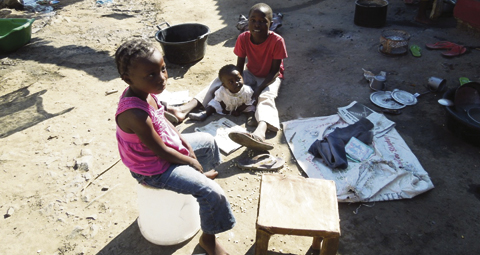August 7 | ![]() 0 COMMENTS
0 COMMENTS ![]() print
print

Cabbages and chemistry
MARIAN PALLISTER from MISSIO SCOTLAND explains how the charity is helping to meet the educational needs of many children in Lusaka, Zambia
In Zambia, cabbage is a vital part of the daily diet. A typical family meal will be nsima—it’s made from maize flour and equates with our fill-up elements such as
potatoes, pasta or rice—cabbage and beans. In Soweto market in Lusaka, there are mountains of cabbages sold every day, and they become a tasty part of the meal when they are finely chopped and sweated in cooking oil with onion, garlic and tomatoes. But in reality, it wouldn’t matter if they were tasteless and lacking in texture like the ones your Granny boiled to death, because in Zambia, cabbage is cheap enough for even the poorest family to be able to serve up. And with 70 per cent of Zambia’s population in ‘informal’ employment that brings in £1 a day, even the cost of a cabbage can blow the household budget.
The Jesuit Centre for Theological Reflection in Lusaka, the Zambian capital, calculates a monthly ‘basic needs’ cost—what a monthly shopping basket, plus the essentials such as housing, electricity and water, costs a family of five. The centre takes its prices across a range of suppliers and comes up with both rural and urban totals. For the month of June, JCTR reckoned their family of five in Lusaka would have had to spend £318.50 on their basic needs. When they say basic, they mean very basic. There is no wriggle room to cover leisure activities or bus fares. Included in the shopping basket along with 4kg of cabbage, are 50kg of mealie meal—the flour to make nsima—3 litres of cooking oil, 3kg of beans and 4kg of beef.
In wartime Britain, the allowance of bacon and ham alone—beef and mutton were rationed according to price—for a family of five was 2kg. Those limitations were imposed because during wartime in Britain there were severe food shortages. In Zambia, in 2015, food is available, but too many people just don’t have the money to buy it.
A bank clerk might earn just 1500 Zambian Kwacha a month. That’s around £125. And yes, that means the bank clerk’s wife and three children are £193.50 short of meeting their ‘basic needs.’ The child care worker whose wage amounts to £83.54 a month, but whose rent is free because he works on the premises finds himself borrowing against his wages every month to buy the most basic furniture and clothes for his toddler. The women who pick up a few kwacha here and there selling fruit or cleaning houses don’t include beef or fish in their shopping baskets and they make ends meet by feeding their families just one meal a day.
Phoebe runs a small project in the countryside on the west side of Lusaka. It’s an area settled by vulnerable families —people who moved to the capital from poor rural areas only to be disillusioned by the discovery that Lusaka’s streets aren’t even paved with Zambia’s famous copper, let alone gold. There are single mums, grannies looking after half a dozen grandchildren, men who’ve run out of dreams and sunk into a permanent haze of cheap home-brew supplied in the local shebeen.
The project is called Lonjedzani, and around a dozen girls call in at Phoebe’s house for breakfast on their way to elementary school. That’s what the funding Phoebe is given is supposed to pay for. In fact, the girls will be found there on their way home, too—snacking on whatever Phoebe manages to rustle up. They do their homework at her house. They pour out their problems. She fights their battles.
When they go home, they will be lucky to get a plate of nsima and cabbage, sitting in the darkness of a traditional hut that their granny probably made herself from ‘sand-pie’ bricks before sharing the space to sleep on a raffia mat on the floor.
Phoebe has managed to beg funding to pay school fees so that some of the girls could go to secondary school. With just one term to go, the money has run out for Rebecca. She has one term of Grade 11 to complete and then faces a crisis if she can’t complete Grade 12. It’s a bit of a miracle that Rebecca has made it this far through secondary education.
Two factors militate against children from challenged families going to secondary school at all. The obvious one is the money. Fees have to be paid and the family that can’t afford a cabbage can’t afford school fees. Less obvious for us in the UK where education is free at the point of delivery, and delivery is within reach of even rural children with the provision of free transport, is that secondary schools are in short supply, even in the city.
None of the 40 children who passed to go to secondary school from Tubalange elementary school in 2013 could take up the places allocated to them by the government because they were too far away. Neither daily transport nor boarding hostels were affordable and these kids finished their education after their Grade 9 exams—the equivalent of National 5 and of little value in a fiercely competitive job market.
The destructive once-a-day nsima and cabbage circle was perpetuated for 40 bright youngsters.
A hopeless situation? Not since Missio Scotland and the Argyll-based charity ZamScotEd stepped in. For more than a decade, ZamScotEd SCIO (formerly the Mthunzi and Lilanda Initiative) has been paying secondary school fees for cared-for children at the Mthunzi Children’s Programme—an orphanage in Lusaka West. Seeing that this left so many smart kids in the area out in the cold, ZamScotEd decided to build a secondary school right there in the middle of four elementary schools and now Missio Scotland is match funding the charity’s efforts to complete the first three classrooms for the start of the Zambian academic year in January 2016. Teresian Sisters will run St Columba’s, and plans are being hatched to make sure that pupils will not go hungry. With the help of Missio Scotland and ZamScotEd supporters, cabbage and chemistry will be on the curriculum.
—http://www.missio.scot
From Ad Gentes to Evangelii Gaudium
This year we celebrate 50 years of Ad Gentes, the decisive document on missions that came out of the Second Vatican Council.
The majority of us today though, might ask: ‘What on earth is Ad Gentes?’ ‘Ad Gentes,’ means ‘To the Peoples of the World.’
To mark the occasion each national Church has been asked to organise Liturgies and formation programmes to reflect on the decree, its message and to explain why it was and remains, important.
In response to this invitation, Missio’s Pontifical Missionary Union is organising, alongside the Conforti Institute and the Pastoral Office of the Archdiocese of St Andrews and Edinburgh are organising a Mission conference this November. Announce; proclaiming the Gospel from Ad Gentes to Evangelii Gaudium, aims to help us reflect on the Mission of the Church today, in light of the 50 years that have passed since the promulgation of Ad Gentes and the more recent encyclical of Pope Francis: The Joy of the Gospel.
—For more information about the conference or to sign up please contact Sr Stacey at the Missio Office: [email protected] or 01236 449774. All participants are asked to register before the event











